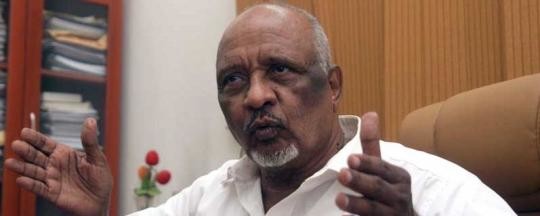Zein al-Abdin, a political observer and member of Sudan’s Islamic Movement, has questioned how much change there will be in the upcoming government reshuffle in Khartoum, saying he expects Vice President Bakri Hassan Saleh to remain in the position he had held.
President Omar al-Bashir earlier this week decreed the removal of all his ministers, both vice presidents and his presidential advisors and aides. He has not yet appointed replacements.
Zein al-Abdin, who works as a professor of political science at the University of Khartoum, downplayed how much change will come in the current reshuffle. In an interview with Radio Tamazuj, he hinted that Bakri Hassan Saleh might be reinstated as the country’s First Vice President.
The Sudanese intellectual also questioned whether Bashir, who is now 71-years old, has not been in power for too long to initiate reforms. “The ruling party is the same party which has been running the country’s affairs since 25 years ago,” he said.
“I don’t think that a leader who is 70 years old can come up with new initiatives toward reform.”
Zein Al Abdin also said that the other political parties which had been participating in the NCP-led government were not involved in any decision-making in the country. The political scientist described the other political parties allied to Bashir’s government as “weak on the ground.”
Situation in Darfur
Separately, Professor Zein Al Abdin said the United Nations – African Union Mission in Darfur (UNAMID) is now developing an ‘exit strategy’ to pull out from the Darfur region. He said the move will make it difficult for the international community to monitor human rights abuses committed by the government and its security organs in the region.
The Islamist leader predicted the security situation will deteriorate further if there will be no human rights monitors on the ground in Darfur, pointing to the possibility for further fragmentation of the country. “One can conclude by saying that such a situation could force the people of Darfur to think about self-determination like what had happened in South Sudan. Yes, that may happen,” he said.
Search for national consensus
Professor Zein al-Abdin indicated his support for a ‘national consensus’ process could take place if the wars in Sudan end. But the president is still convinced that he could bring an end to the current rebellions through the barrel of a gun, said the Sudanese professor, referring to Blue Nile, Darfur and South Kordofan.
“Even if you defeated the rebels in one, two, or three battles, the guerrilla war will not end especially if that rebellion had a political agenda and sympathisers,” he explained.
“You know, the government spends over 70% of the budget on war efforts. So bringing about peace is the first objective, and the second objective is a national consensus to address problems facing education, industry, agriculture and health,” he said.
President Bashir announced a national dialogue initiative in late January last year calling for “a great leap” that can lead to a national political consensus. The initiative was boycotted by some political parties and armed movements while others accepted to participate.
Photo: Professor Zein al-Abdin



